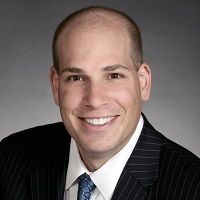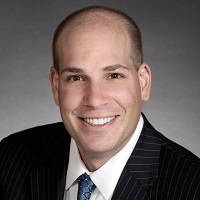Take Charge of Retirement Spending With This Simple Strategy
To make sure you're in control of retirement spending, rather than the other way around, allocate funds to just three purposes: income, protection and legacy.


Profit and prosper with the best of Kiplinger's advice on investing, taxes, retirement, personal finance and much more. Delivered daily. Enter your email in the box and click Sign Me Up.
You are now subscribed
Your newsletter sign-up was successful
Want to add more newsletters?

Delivered daily
Kiplinger Today
Profit and prosper with the best of Kiplinger's advice on investing, taxes, retirement, personal finance and much more delivered daily. Smart money moves start here.

Sent five days a week
Kiplinger A Step Ahead
Get practical help to make better financial decisions in your everyday life, from spending to savings on top deals.

Delivered daily
Kiplinger Closing Bell
Get today's biggest financial and investing headlines delivered to your inbox every day the U.S. stock market is open.

Sent twice a week
Kiplinger Adviser Intel
Financial pros across the country share best practices and fresh tactics to preserve and grow your wealth.

Delivered weekly
Kiplinger Tax Tips
Trim your federal and state tax bills with practical tax-planning and tax-cutting strategies.

Sent twice a week
Kiplinger Retirement Tips
Your twice-a-week guide to planning and enjoying a financially secure and richly rewarding retirement

Sent bimonthly.
Kiplinger Adviser Angle
Insights for advisers, wealth managers and other financial professionals.

Sent twice a week
Kiplinger Investing Weekly
Your twice-a-week roundup of promising stocks, funds, companies and industries you should consider, ones you should avoid, and why.

Sent weekly for six weeks
Kiplinger Invest for Retirement
Your step-by-step six-part series on how to invest for retirement, from devising a successful strategy to exactly which investments to choose.
After a lifetime of saving, many people have accumulated a hefty amount of money as retirement beckons. A recent report showed nearly half of 401(k) accounts had a balance of $1 million or more, which is impressive.
But regardless of how much or how little money soon-to-be retirees have saved, one big question often haunts them: Will my savings be enough to see me through 20, 30 or more years of retirement? The uncertainty leaves some people afraid to spend too much beyond necessities, worried the money will dry up while the long retirement runway still stretches before them.
It does not have to be this way. You can begin to take the guesswork out of retirement spending by assigning purpose to your money. This will help you feel more confident you won’t wake up one morning to discover your savings have vanished.
From just $107.88 $24.99 for Kiplinger Personal Finance
Become a smarter, better informed investor. Subscribe from just $107.88 $24.99, plus get up to 4 Special Issues

Sign up for Kiplinger’s Free Newsletters
Profit and prosper with the best of expert advice on investing, taxes, retirement, personal finance and more - straight to your e-mail.
Profit and prosper with the best of expert advice - straight to your e-mail.
Ideally, as you approach this task, you divide that purpose into three categories: Income, protection/lifestyle and legacy.
Each category is essential, but how much of your savings finds its way into each category will depend on your situation, needs and long-term goals. It’s not as easy as allocating one-third to each category and declaring yourself set. That won’t work and could provide disastrous results.
At the same time, the situation isn’t so complex that it’s beyond explaining. Let’s take a look at each of the three purposes and explore how to fund them.
Income
This is your money’s first purpose: to provide a steady income stream to replace the paycheck that’s no longer deposited in your bank account. Review what guaranteed streams of money you are expecting, such as Social Security, a pension, an annuity or interest on bonds or CDs.
Then with your retirement savings — a 401(k), an IRA or another type of account — determine what percentage you can withdraw each year to add to your income without draining that account sooner than you want. In years past, people followed the 4% rule, which said you should withdraw 4% from your savings the first year of retirement, then increase that amount each year to account for inflation.
Unfortunately, the 4% rule became outdated during the 2008 financial crisis and the optimum withdrawal rate dropped. More recently, the rule has made something of a comeback and 4% is once again becoming a reasonable target withdrawal rate after being at 3.3% in 2021 and 3.8% in 2022, according to a 2023 study by Morningstar.
Protection/lifestyle
Unexpected expenses happen in retirement just as they do throughout the rest of life. Perhaps your house needs a new roof. Or your vehicle breaks down, forcing you to invest in a costly repair or a new car.
At the same time, many people choose to travel in retirement, which is often a significant expense in itself and doesn’t fit neatly into the monthly budget.
Such expenditures are the second purpose for your money. You want money set aside to pay for extra expenses outside the monthly budget, whether those expenses are for fun or for dealing with sudden catastrophes. Most likely this money won’t draw a large amount of interest because it needs to be safely invested and available quickly if the moment arises.
One potential expense that falls into the protection purpose and can devastate your savings is long-term care, which many people will need in retirement. Because of the extraordinarily high cost of such care, this expense can be more difficult to plan for. Options include long-term care insurance or a life insurance policy that includes a long-term care rider. Some life insurance policies also include a chronic illness rider, which allows the policyholder to use part of the death benefit while they are still alive to pay for treatment of the chronic illness. As the need for and expense of long-term care has grown, some states have explored creating their own long-term care insurance programs.
Legacy
A third purpose for your money in retirement is legacy — what you hope to leave behind for family members or a favorite charity. As you devise plans for this money, you will want to look into strategies that can help you minimize the amount that goes to the IRS. Just one strategy that can help avoid or reduce estate and inheritance taxes is to start giving your heirs some of the money now as gifts. You can give each individual person up to $18,000 annually before a gift tax comes into play. A married couple can give $18,000 each, or a total of $36,000, to an individual (in 2025, that goes up to $19,000 per person, or $38,000 for a married couple).
The purpose you give your money in retirement is ultimately up to you, but a financial professional can provide guidance on how you can get the most out of that money, regardless of whether it’s for income, protection/lifestyle or legacy.
It’s important to plan because without determining the purpose for your money, the money will manage you rather than the other way around.
Ronnie Blair contributed to this article.
The appearances in Kiplinger were obtained through a PR program. The columnist received assistance from a public relations firm in preparing this piece for submission to Kiplinger.com. Kiplinger was not compensated in any way.
Related Content
- Three Ways to Create a Stronger Income Plan for Retirement
- Five Tax Strategies to Preserve Your Retirement Savings
- Make Longevity Risk Part of Your Retirement Plan
- A 10-Year Retirement Planning Checklist
- Three Details That Matter for a Successful Retirement
Profit and prosper with the best of Kiplinger's advice on investing, taxes, retirement, personal finance and much more. Delivered daily. Enter your email in the box and click Sign Me Up.

Mark Gelbman is the owner and adviser at Strategic Wealth Solutions in Urbandale, Iowa, who has more than 20 years of experience helping clients achieve their financial planning goals. His certifications include the CFP®, CLU®, CRPC® and AAMS® designations. Gelbman believes that the key to achieving financial planning success is taking that first step and implementing incremental change rather than radical change.
-
 Nasdaq Leads a Rocky Risk-On Rally: Stock Market Today
Nasdaq Leads a Rocky Risk-On Rally: Stock Market TodayAnother worrying bout of late-session weakness couldn't take down the main equity indexes on Wednesday.
-
 Quiz: Do You Know How to Avoid the "Medigap Trap?"
Quiz: Do You Know How to Avoid the "Medigap Trap?"Quiz Test your basic knowledge of the "Medigap Trap" in our quick quiz.
-
 5 Top Tax-Efficient Mutual Funds for Smarter Investing
5 Top Tax-Efficient Mutual Funds for Smarter InvestingMutual funds are many things, but "tax-friendly" usually isn't one of them. These are the exceptions.
-
 Nasdaq Leads a Rocky Risk-On Rally: Stock Market Today
Nasdaq Leads a Rocky Risk-On Rally: Stock Market TodayAnother worrying bout of late-session weakness couldn't take down the main equity indexes on Wednesday.
-
 Quiz: Do You Know How to Avoid the 'Medigap Trap?'
Quiz: Do You Know How to Avoid the 'Medigap Trap?'Quiz Test your basic knowledge of the "Medigap Trap" in our quick quiz.
-
 5 Top Tax-Efficient Mutual Funds for Smarter Investing
5 Top Tax-Efficient Mutual Funds for Smarter InvestingMutual funds are many things, but "tax-friendly" usually isn't one of them. These are the exceptions.
-
 Why Invest In Mutual Funds When ETFs Exist?
Why Invest In Mutual Funds When ETFs Exist?Exchange-traded funds are cheaper, more tax-efficient and more flexible. But don't put mutual funds out to pasture quite yet.
-
 We Retired at 62 With $6.1 Million. My Wife Wants to Make Large Donations, but I Want to Travel and Buy a Lake House.
We Retired at 62 With $6.1 Million. My Wife Wants to Make Large Donations, but I Want to Travel and Buy a Lake House.We are 62 and finally retired after decades of hard work. I see the lakehouse as an investment in our happiness.
-
 Social Security Break-Even Math Is Helpful, But Don't Let It Dictate When You'll File
Social Security Break-Even Math Is Helpful, But Don't Let It Dictate When You'll FileYour Social Security break-even age tells you how long you'd need to live for delaying to pay off, but shouldn't be the sole basis for deciding when to claim.
-
 I'm an Opportunity Zone Pro: This Is How to Deliver Roth-Like Tax-Free Growth (Without Contribution Limits)
I'm an Opportunity Zone Pro: This Is How to Deliver Roth-Like Tax-Free Growth (Without Contribution Limits)Investors who combine Roth IRAs, the gold standard of tax-free savings, with qualified opportunity funds could enjoy decades of tax-free growth.
-
 One of the Most Powerful Wealth-Building Moves a Woman Can Make: A Midcareer Pivot
One of the Most Powerful Wealth-Building Moves a Woman Can Make: A Midcareer PivotIf it feels like you can't sustain what you're doing for the next 20 years, it's time for an honest look at what's draining you and what energizes you.